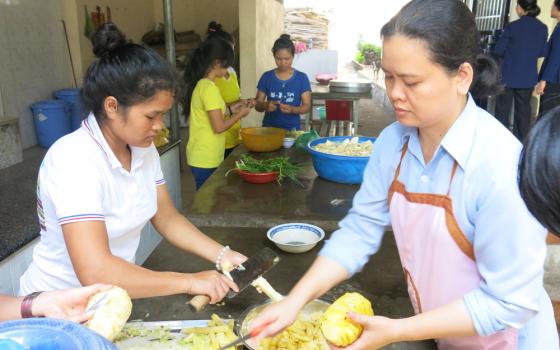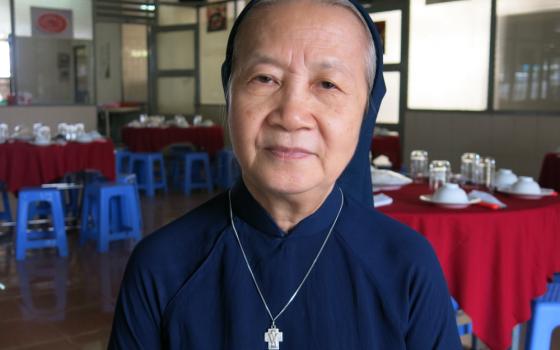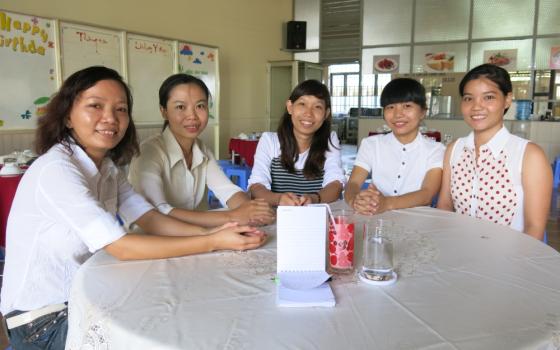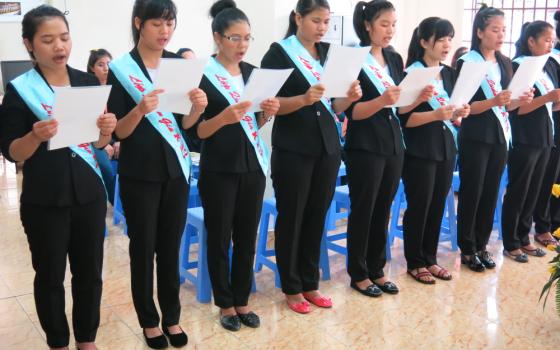When Daughters of Charity of St. Vincent De Paul sisters started providing courses on housework for disadvantaged young women eight years ago, many people undervalued their work. In Vietnamese society, working as a housemaid is seen as lowly, like being a slave.
Sr. Pascale Le Thi Triu, an organizer, said her community saw a growing need for housemaids in the economically booming Ho Chi Minh City, so they took the initiative to help.
“We have trained 300 professional housemaids and have met only one fourth of the demand for housemaids in the city,” she said.
Triu is head of the nuns’ social service office, where women aged 17 to 25 are selected by priests and nuns from respectable families for the year-long training program. Four nuns serve as teachers at the Salesian-run Phuoc Loc Vocational Training Center in the neighboring Ba Ria Vung Tau Province – the only center teaching housework skills in the country.
The women come from remote areas, many barely having finished secondary schools. They learn how to do household chores, cook various foods, serve food at restaurants and hotels and use domestic appliances that many of them have never seen before.
Sr. Triu, 70, said, “It is important that they are taught moral and humane values, as well as ways to keep financial accounts, save water and classify garbage for recycling and composting. They also learn how to manage their time and work.”
Eighteen women graduated from the center in mid-August. At a ceremony in front of sisters and some alumni of the program, they promised to work hard, be honest, behave well and bear witness to the Gospel.
Many graduates were beginning their new jobs the following day, with expected monthly salaries of at least 3.2 million dong (U.S. $152). The current labor market favors workers who have vocational skills instead of degrees. Over 162,000 college graduates have no jobs, according to local media reports, so the nuns’ program is on track with demand.
Triu talked about the sisters’ work to heighten public awareness about housemaids, advocating for fair treatment by employers, including being paid on time and working five or six days a week, for 8 hours a day.
“It is important that housemaids have time to enjoy life and develop themselves,” she said. Housemaids in some places are still disrespected, do what house owners ask at any time of the day or night, are poorly paid and have no access to education or entertainment. This is where the slavery perception comes in.
Sr. Triu said the housemaids’ mission is “to bring peace, happiness, truth, prestige, tidiness, food hygiene and safety to house owners.” Many people feel quite secure in their choice to hire the women the sisters train, she added.
As part of the conditions, employers are asked to provide contracts. They must provide housemaids with proper accommodation at their houses to protect them from sexual exploitation and must pay their salaries regularly and on time. Householders also are not to feed them from leftovers. The nuns continue to act as mediators during employment, whenever either employers or maids have problems with each other.
The nun told a story about a foreign woman who complained about her housemaid’s performance when she had asked her maid to oversee workers repairing her house. The workers damaged her expensive sofa by accident, and the homeowner blamed her maid. The sisters defended the maid, saying the woman had unreasonable expectations. There was no way the maid could get her domestic chores done and pay attention to what a construction crew was doing at the same time. The woman fired the maid, but the nuns compelled her to pay that month’s salary as well as a half-month’s salary severance pay.
Housework empowers disadvantaged women
Housemaids from the sisters’ program meet once a month at the convent to share their experiences and celebrate one another’s patron saints. They take vacations around the country to see tourist attractions and religious sites and learn more about their culture and cuisine.
After working for a few years, many get married and run small restaurants for a living.
Maria Tran Thi Ngoc Han has been working for five years, currently for an Australian family; she is paid 6.9 million dong a month.
Han used to think housework was menial, demeaning labor, but she gradually discovered its values. “I can arrange my work and time well, win praise from house owners, express myself and enjoy life pleasures,” she said.
Han, who studies English after work, said her colleagues seek to finish high school and further their studies at colleges or study English, accountancy and other subjects.
Maria Goretti Nguyen Thi Huyen, 24, said, “I am very proud of my work and live a happy life. I also help my friends understand what is meaningful about the work we do, and they change their minds about housemaids.” She was even able to save extra money to pay back what she had borrowed from nuns for her course fees.
[Joachim Pham is a correspondent for Global Sisters Report based in Vietnam.]



